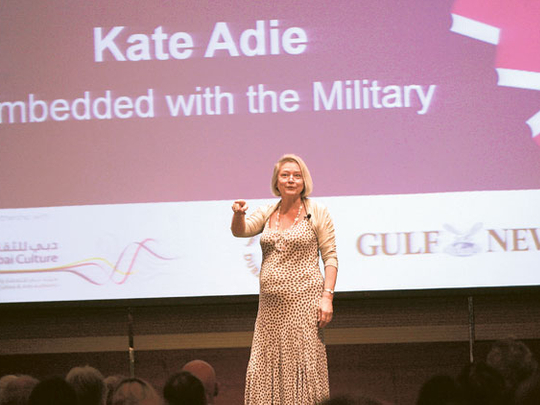
Dubai: The censorship of wars has been around for a "long time", veteran BBC reporter Kate Adie said to a packed audience at the Emirates Airline Festival of Literature on Friday.
"When anyone talks about censorship, it's been in business a long time - it's not a modern invention," she said in the context of the Crimean War. Before two photographers sent to shoot the war took any pictures, the military "tidied up" the battleground; all that was left in the photographs were horse bridles, cannonballs and the remnants of war. The pictures don't really show what happened, because all the corpses had been removed," she said, at the Gulf News sponsored session, introduced by Francis Mathew, Editor-at-Large.
Entitled "Embedded with the Military", Adie's lecture questioned what embedding actually is and what it means for journalists.
"Embedding is a power struggle between the press - who want everything; the military -
who think it's probably everything; and politicians - who only want certain things," she said, adding, "It's only certain wars that actually get covered".
For instance, five million lives have been lost in the Democratic Republic of Congo since the Millennium; but there are no reporters there.
"You don't see all of war on TV, it's censored. This is not only for operational reasons, but to see heads chopped off, the screaming and dying is not on your screen for what we call taste. A sanitized view of war is on your screen," Adie said.
Almost worldwide, the really grisly stuff of war does not get onscreen, she continued.
During the second Gulf War, for example, when Baghdad was being bombed, there were many journalists in the city. However, the only footage being shown on TV were the orange glows of bombs exploding on the horizon. What was really happening was that bodies were being burned until they couldn't be found by the next day, she said.
Journalists covering a war have the problem of being in the middle, the problem of neutrality. This, Adie said, is a question that has already been raised with the recent uprising in the Middle East.
"It's a heavyweight argument: who's side are you on? You wouldn't believe how important your passport is when you're reporting a war, because everyone asks where you're from," she said.
Adie is a three-time author. Her first book "The Kindness of Strangers" (2002) is an account of her work as a reporter and remained on the Sunday Times bestseller list for 37 weeks. "Nobody's Child: The Lives of Abandoned Children" was published in 2005 and "Into Danger" followed in 2008.
One thing Adie felt important to question is why a reporter is there, reporting a war.
"I feel strongly that we should know how our world turns. Everybody has a right to know what's going on in their world and what's being done in their name.
Emirates Airline Festival of Literature, now in its third year, is held under the patronage of His Highness Shaikh Mohammad Bin Rashid Al Maktoum, Vice-President and Prime Minister of the UAE and Ruler of Dubai, in partnership with Emirates Airline and the Dubai Culture & Arts Authority (Dubai Culture).










